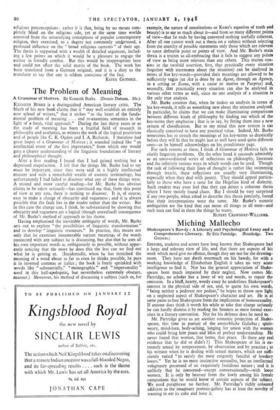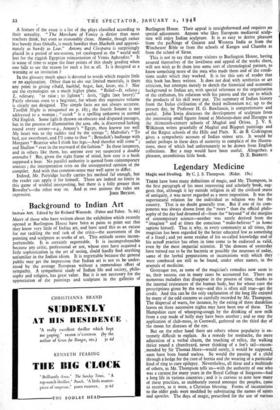Miching Mallecho
EDITORS, students and actors have long known that Shakespeare had a large and tolerant view of life, and that there are aspects of his work which need give no offence, though they are not for the drawing- room. They have not dwelt overmuch on his bawdy, for with a working knowledge of Elizabethan English it takes no very acute intelligence to find it. Nor has the 'general appreciation of Shake- speare been much impaired by their neglect. Now comes Mr. Partridge, no scholar but a lover of wit and words, to repair the omission. In a bluff, hearty, wordy essay he underlines Shakespeare's interest in the physical side of sex, and, to quote his own words, " being neither a pederast nor pedant," he hopes to throw new light on a neglected aspect of Shakespeare's character and art. He is at some pains to free Shakespeare from the implication of homosexuality. If anyone does think it worth his while to take that charge seriously he can hardly dismiss it by reading the Sonnets as mere formal exer- cises in a literary convention. Nor for his defence does he need to.
Mr. Partridge gives us yet another romantic projection of Shake- speare, this time in pursuit of the unsterbliche Geliebte ; spirit- weary, mind-lorn, body-aching, longing for union with the woman who could bring him peace and bliss of perfect understanding. He never found that woman, that home, that peace. (Is there any real evidence that he did or didn't ?) This Shakespeare of his is ex- tremely sexual by temperament, by observation and by practice ; at his wittiest when he is dealing with sexual matters, which are suffi- ciently varied " to satisfy the most exigently fanciful of lewdery lovers." Yet he is no mere instinctive sensualist,, but an intellectual voluptuary possessed of an exquisitely fastidious nature ; and it is unlikely that he consorted—except conversationally—with loose women. It is only by hearsay from the lowly among his female companions that he would know of certain aspects of the subject. We need paraphrase no further. Mr. Partridge's richly coloured addition to the imaginary portrait-gallery has at least the novelty of wanting to eat its cake and have it. A feature of the essay is a list of the plays classified according to their sexuality. " The Merchant of Venice is dirtier than most teachers think, but even so reasonably clean. Hamlet, though rather less bawdy than Othello, is much bawdier than Macbeth and approxi- mately as bawdy as Lear." Antony and Cleopatra is surprisingly placed in a period of sex-nausea, yet catalogued as the "world well lost for the riggish Egyptian reincarnation of Venus Aphrodite." It is waste of time to argue the finer points of this shady grading when one fails to see the reason for such a list at all. Is it designed as a warning or an invitation ?
In the glossary much space is devoted to words which require little or no explanation. Other than to eke out limited materials, is there any point in giving ribald, bashful, beget, lust, lover, etc. ? Nor are the etymologies on a much higher plane. " relievo ; L. relevare. ' to raise ; to lighten ': levis, ' light (not heavy)." Fairly obvious even to a beginner, for whom this expensive volume is clearly not designed. The simple facts are not always accurate. Twelfth Night is misquoted on p. 583; the fourth Sonnet is not addressed to a woman ; "avid?" is a spelling unknown in normal Old English. Some light A thrown on obscure and disputed passages, but in the process of illumination the sens. obs. is discovered lurking round every corner—e.g., Antony's " Egypt, thou knewst too well My heart was to thy rudder tied by the strings "; Malvolio's " To bed, aye sweetheart, and I'll come to thee " ; Benedick's badinage with Margaret " Beatrice who I think has legs.—And therefor will come " ; and Shallow " ever in the rearward of the fashion." In these instances, and in others like them, has anyone ever yet suspected a double entendre ? But, given the right frame of mind, how easy is a bush supposed a bear. No parallel authority is quoted from contemporary sources ; the interpretation rests on the unsupported opinion of the compiler. And with that common-sense may well agree to differ. Indeed, Mr. Partridge hardly carries his method fat enough, but the reader can apply it for himself. There are indeed no limits in this game of wishful interpreting, but there is a folly greater than Bowdler's--rthe other way on. And at two guineas the rules are







































 Previous page
Previous page